

Mexico's place names and their meanings. Tony Burton I’ll break your jaw!
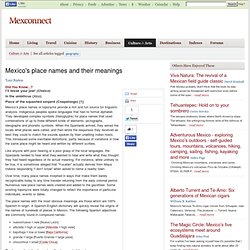
Norman Toponymy. Toponymical list of counties of the United Kingdom. Place names in Irish. List of generic forms in place names in the United Kingdom and Ireland. Welsh Placenames. From Wikipedia, the free encyclopedia The castle at Caernarfon (meaning in Welsh, "the fortress in Arfon"), which was formerly anglicised as "Carnarvon" or "Caernarvon".
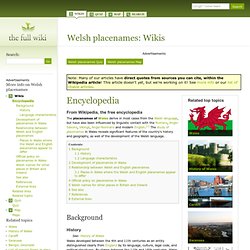
The name "Arfon" refers to the area "opposite Môn" or Anglesey. The placenames of Wales derive in most cases from the Welsh language, but have also been influenced by linguistic contact with the Romans, Anglo-Saxons, Vikings, Anglo-Normans and modern English.[1] The study of placenames in Wales reveals significant features of the country's history and geography, as well of the development of the Welsh language. Background History See: History of Wales Wales developed between the 4th and 11th centuries as an entity distinguished clearly from England by its language, culture, legal code, and political structures.
Language characteristics See: Welsh language and History of the Welsh language Development of placenames in Wales Elsewhere, many villages and later towns took their names from natural features. See also Welsh exonyms. Belgian Toponymy. Quick overview of common toponymic suffixes in Belgium Toponymy of Flanders & Brussels Suffixes in Flanders are usually the same in every province.
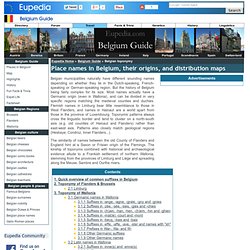
Their etymology is obvious since the words haven't changed in modern Dutch and are quite similar to English too. The most common are -bos (wood, bush), -berg(en) (mount), -broek (brook, creek), -burg (town), -damme (dam), -dijk (dyke), -donk (bog, swamp), -duin (dune), -hoek (corner), -hout(en) (wood), -kamp (camp), -kapelle (chapel), -kerk(en) (church), -laar/lare (marshy wood), -loo (wood, grove) -munster (minster, abbey), -veld (field) and -voorde (ford). Gallo-Roman settlements had suffixes in -acum, which in modern Dutch have become -aken (as in Montenaken), -zake (e.g. The eastern province of Antwerp has the particularity of having a lot of names in -hout and -donk. A few Flemish suffixes have regional variations in spelling : -beek/beke, -laar/lare and -daal/dael/dale. Colorado Toponymy. (or placenames) You may be familiar with the Spanish language, but that doesn't mean you know how to pronounce Buena Vista.
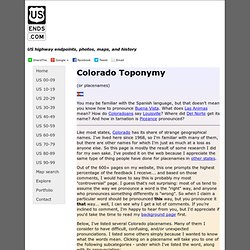
What does Las Animas mean? How do Coloradoans say Louisville? Where did Del Norte get its name? And how in tarnation is Piceance pronounced? Like most states, Colorado has its share of strange geographical names. Out of the 600+ pages on my website, this one prompts the highest percentage of the feedback I receive... and based on those comments, I would have to say this is probably my most "controversial" page. Below, I've listed several Colorado placenames. Depending on how many words are in a particular subcategory, you may have to scroll down to find your word, which will be listed alphabetically within its subcategory.
I wasn't sure whether diacritical marks would display correctly on all platforms, so instead I opted to use only standard letters for the pronunciations. Top / Mispronounced / Spanish / Indian / French / Syllable / Confusing / Other states. Place-names in The Danelaw. One of the most noticeable differences between The Danelaw and the rest of England is that it contains many hundreds of place-names which are Scandinavian in origin.
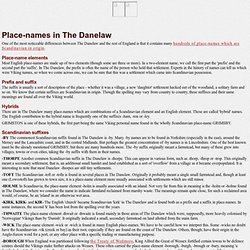
Place-name elements Most English place-names are made up of two elements (though some are three or more). In a two-element name, we call the first part the 'prefix' and the second part the 'suffix'. In The Danelaw, the prefix is often the name of the person who held that settlement. Experts in the history of names can tell us which were Viking names, so when we come across one, we can be sure that this was a settlement which came into Scandinavian possession. Prefix and suffix The suffix is usually a sort of description of the place - whether it was a village, a new 'daughter' settlement hacked out of the woodland, a solitary farm and so on. Hybrids.
Institute for Name Studies. English Place Names. History of English Place-Names. Articles > Names A Survey of the History of English Placenames By Dame Cateline de la Mor la souriete The subject of English placenames is a complicated one.
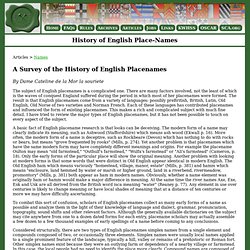
There are many factors involved, not the least of which is the waves of conquest England suffered during the period in which most of her placenames were formed. The result is that English placenames come from a variety of languages: possibly preBritish, British, Latin, Old English, Old Norse of two varieties and Norman French. A basic fact of English placename research is that looks can be deceiving. To combat this sort of confusion, scholars of English placenames collect as many early forms of a name as possible and analyze them in the light of their knowledge of language and dialect, grammar, pronunciation, topography, sound shifts and other relevant factors.
Meanings of Irish place names.